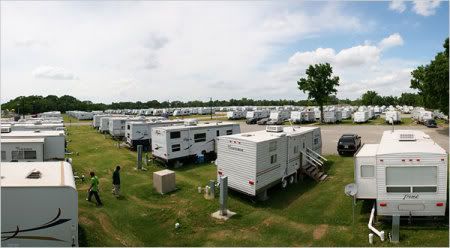Gulf Watch: FEMA begins closing Katrina trailer parks while affordable housing fight drags on
 There are reports of confusion and anger at FEMA trailer parks today over the agency's unclear policy on the parks' future.
There are reports of confusion and anger at FEMA trailer parks today over the agency's unclear policy on the parks' future.
Earlier this week, the Associated Press reported that a number of the parks would be closing today as part of the effort to move residents into permanent housing. But now the agency is saying that the parks will stay open as long as there are residents who have not found apartments or houses to rent, according to the Baton Rouge Advocate. That has upset some trailer residents like Celeste Jackson, who packed up her belongings yesterday despite not having anywhere to go.
FEMA officials said the agency passed out fliers two months ago notifying residents of the pending closing and encouraging them to contact their FEMA case workers. However, only some residents responded, according to a FEMA spokesperson.
The agency has said that it wants all the Katrina parks closed by the end of next May. But concerns remain about where the more than 6,000 households still living in those parks will go, given the dearth of affordable housing in New Orleans, where fair-market rents have risen 45 percent since the storm.
Meanwhile, the state's political leaders remain at an impasse over legislation that would boost the number of affordable housing units available for displaced people who want to return to New Orleans and other Gulf communities.
As we've reported here previously, the Gulf Coast Housing Recovery Act sponsored by Sen. Mary Landrieu (D-La.) had the support of the entire state's delegation and the U.S. Department of Housing and Urban Development -- until September, when HUD and Sen. David Vitter (R-La.) suddenly withdrew their backing. Vitter has incorrectly accused the bill of attempting to re-create New Orleans' troubled public housing complexes exactly as they were before Hurricane Katrina, when in fact it allows those complexes to be torn down and replaced by either subsidized public housing, partially subsidized units, or vouchers to offset rent in privately owned housing.
There's been much speculation over Vitter's sudden about-face on the measure, especially since he's been reluctant to disclose his objections in much detail. A story about the controversy in the latest Congressional Quarterly Weekly offers partisan politics as one explanation for his actions:
...[P]olitical experts say the senatorial flap is not unexpected, given Louisiana's rough-and-tumble politics and Vitter and Landrieu's chilly relationship. Landrieu is up for re-election next year and has emerged as the GOP's top target among incumbent senators, in part because of the state's rightward shift in recent elections.
"The fact that Mary Landrieu is widely identified as the most vulnerable Democrat coming into the next election cycle, you certainly don't want to give her big victories in helping the state," said Kirby Goidel, a professor of political science at Louisiana State University. "He probably feels safe enough to hold it up as long as it's not too obviously political and he has some policy-related cover. He's a pretty hardball political player."
The story notes that political insiders have pretty much given up on any chance of Vitter's support, and the bill probably can't move without his approval. If the only victims of the senator's obstinacy were his low-income constituents, we could almost understand his cold political calculus. But what makes Vitter's position particularly puzzling is that he's also bucking business groups like the Chamber for Southwest Louisiana and Greater New Orleans Inc., who recognize that the region's reconstruction is imperiled by workers' inability to find affordable housing.
Tags
Sue Sturgis
Sue is the former editorial director of Facing South and the Institute for Southern Studies.
